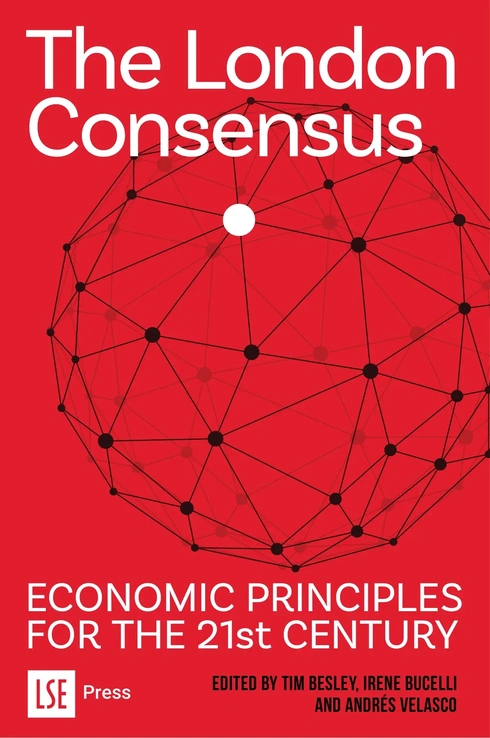
The London Consensus: Economic Principles for the 21st Century
No ratings
Tim Besley, London School of Economics
Irene Bucelli, London School of Economics
Andrés Velasco, London School of Economics
Copyright Year:
Publisher: LSE Press
Language: English
Formats Available
Conditions of Use
![]() Attribution-NonCommercial
Attribution-NonCommercial
CC BY-NC
Table of Contents
- Preface
- Towards a London Economic Consensus: an introduction
Part I: Innovation and Productivity
- Fostering green and inclusive productivity growth
- On productivism
Part II: Trade
- International trade since the Washington Consensus: the gains and the pains
- Export-led growth
Part III: Macroeconomic Policy
- Fiscal policy and public debt
- Monetary and financial policies
Part IV: Labour Market
- Labour markets and the future of work
- Labour markets and gender inequality
Part V: Cohesion, Equity and Social Policy
- Is there a ‘new consensus’ on inequality?
- Welfare state
- Addressing the learning crisis: an emergent consensus
- Towards resilient and sustainable universal healthcare coverage
Part VI: Environment and Climate Change
- Climate and environment: what we know and what we need to know
- Tackling climate change in low- and middle-income countries
Part VII: Political Economy and State Capacity
- From liberal economic policies to liberal political institutions? Democracy, development clusters and wellbeing
- State capacity
About the Book
A generation ago, the so-called Washington Consensus laid out a series of dos and don’ts for policymakers around the world. Today, that vision is recognised as having fallen short in a number of ways – particularly in its neglect of the social and institutional factors that are indispensable for achieving sustained growth and for building fairer and more cohesive societies.
The immense challenges humanity faces are easy to list: climate change, pandemics, social inequalities, the far-reaching effects of the tech revolution and AI, a fragmenting world economy, and a wave of populism and political polarisation that has undermined support for liberal democracy in many countries. It is much harder to identify a set of new ideas – and policies – that will solve these seemingly intractable global problems.
In this new world, political leaders and policymakers need guidance and principles that can assist when choosing among policy alternatives. To this end, the editors of this volume convened over 50 of the world’s leading economists and policy experts at the London School of Economics and Political Science (LSE). The London Consensus: Economic Principles for the 21st Century is the result of these exchanges. It is not intended as a one-size-fits-all set of economic remedies, but an exercise in assembling the best available evidence and ideas to foster dialogue, and ultimately to develop a set of principles that can address the urgent political, social and economic tasks ahead.
About the Contributors
Editors
Tim Besley is School Professor of Economics and Political Science and W. Arthur Lewis Professor of Development Economics at the London School of Economics (LSE). His main research interests are in studying how governments can more effectively design and deliver economic policies. He has extensive policy experience advising the World Bank, International Monetary Fund (IMF) and European Bank for Reconstruction and Development, and, from 2006 to 2009, he served on the Bank of England Monetary Policy Committee. He is also a member of the UK’s National Infrastructure Commission and was an academic convenor of the Oxford-LSE Commission on State Fragility, Growth and Development, and joint Chair of the LSE Growth Commission. He is a past President of the European Economic Association (EEA), Econometric Society and Royal Economic Society (RES).
Irene Bucelli is Research Officer at the School of Public Policy and the Centre for Analysis of Social Exclusion at LSE. Her research focuses on the relationship between multidimensional inequality and poverty, exploring both theoretically and empirically the interplay between different forms of disadvantage and their implications for policy. She coordinates the LSE Public Policy Review programme at the School of Public Policy and is managing editor of the LSE Public Policy Review journal.
Andrés Velasco is Professor of Public Policy and Dean of the School of Public Policy at LSE. Between 2006 and 2010 he served as Minister of Finance of Chile. He is also an Associate Fellow at Chatham House, the Royal Institute of International Affairs, and a Research Fellow at the Centre for Economic Policy Research (CEPR). In 2023–24 he served on the Task Force on Fiscal Policy for Health; during 2021–23 he was part of the High-Level Advisory Group to the IMF and the World Bank; in 2017–18 he was a member of the G20 Eminent Persons Group on Financial Governance; during 2015–16 he co-chaired the Global Panel on the Future of the Multilateral Lending Institutions; in 2013–16 he was a member of the Global Oceans Commission. Before coming to LSE, he held professorial appointments at the Harvard Kennedy School (HKS), Columbia School of International Public and Affairs (SIPA) and the New York University Economics Department. His research has been published in leading academic journals including the American Economic Review, the Journal of Political Economy, the Quarterly Journal of Economics and the Journal of Economic Theory. In 2006 he received the InterAmerican Development Bank Award for Excellence in Economic Research.
